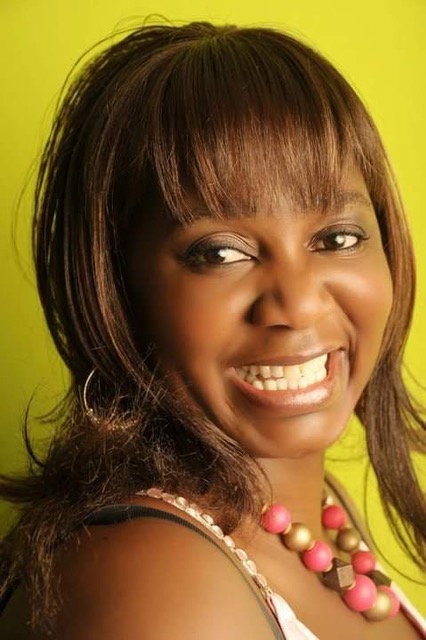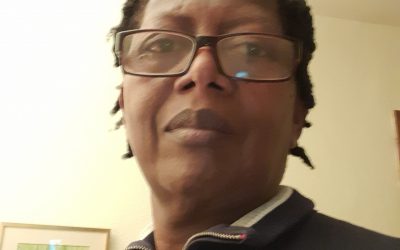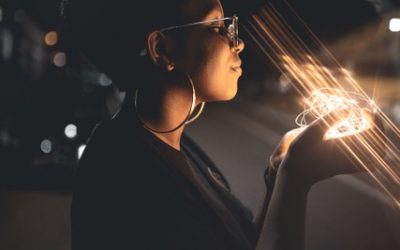
Farisai Dzemwa
by: Sinéad Mangan-Mc Hale
As part of Black History Month (BHM), #SaluteOurSisters, we speak to a woman who knows the value of authenticity, celebrates BHM and uses her lived experiences to support her community while facilitating change and acceptance.
As TGIUK celebrate BHM 2023, we were delighted to speak with Farisai Dzemwa, a mental health professional, an advocate of migrants and members of the BME communities, a craft therapist, a published writer, a community journalist, and a true force of nature. Farisai came to the UK in 2010, and having lived experience with mental health in her native Zimbabwe, she made an active choice to become a mental health professional to help herself and others.
Farisai is among the many acclaimed authors in the TogetherintheUK anthology of migrant writings, Hear Our Stories. Her story, My Life as an Immigrant in so Many Words, was warmly received at the book launch, with many migrants identifying with her words and experiences.
Farisai, thank you for sharing your thoughts with TogetherintheUK on Black History Month (BHM). What does BHM mean to you?
If I am honest, I celebrate BHM with mixed feelings. It is the month when, unapologetically, we acknowledge and celebrate each other in as many ways as possible. Yet, when I reflect on the concept, I think that it should not have to be just a one-month celebration but an integral part of everyday life in the UK. However, I look forward to BHM because I learn something new each year through the celebratory activities and specific yearly themes. That is the critical element of BHM, a strong focus on education – educating people on the history of Black individuals and communities, sharing a greater understanding of Black history and culture, and addressing racism and inequality.
The rest of the year, however, I spend constantly fighting to be heard, acknowledged, and accepted. Sometimes, it happens, but mostly, it’s a losing battle. So, despite life continuing as usual, if I am honest, BHM in October excites me for that is when Black people unite in the celebrations, acknowledging and applauding each other for what we have done, continue to do and will do in the future.
One of the themes for this year’s BHM is #Saluting Our Sisters, celebrating the achievements and contributions of Black women. Is there any woman you would like to salute?
The woman I salute in the UK is one I have seen and continue to see make fresh history in terms of Black sisters in the UK. I have watched this woman fight for change within the immigration process, especially for asylum seekers. She puts her own struggles aside a lot of the time so she can stand for, advocate for and campaign for the better treatment and processing of asylum seekers’ applications for leave to remain. In today’s society, you rarely witness such selflessness, so I feel her name should start to be seen in places where history is captured for future generations to see and learn about. Her name is Loraine Masiya Mponela. She is an unsung hero amongst so many other women I could mention.
Loraine Masiya Mponela is a mother, writer, and migrant rights activist. Originally from Malawi, she migrated to the UK in 2008 and was finally granted Leave to Remain in 2022. She is the ex-chair for Coventry Asylum and Refugee Action Group (CARAG) and co-chair for the Status Now 4 All Campaign. TGIUK is also proud to have included Loraine’s poignant poetry in their anthology of writings on migration, Hear Our Stories.
BHM helps to facilitate change, but what other changes are needed to create a more equal society?
Many changes need to be made, and I could go on forever if I were to tell them all, but some crucial steps are needed to begin a real-time of positive lasting change. Firstly, our leadership must practise what they preach and truly offer equal opportunities in UK society. To do this, they need to stop discrimination, remove the hostile environment policy, and manage misleading media that continually portray migrants in such a negative light. Another sensible step would be if they consulted relevant communities or individuals when deliberating on policies, protocols and procedures that affect those people instead of consulting with each other about communities they have never been truly part of. And finally, we need to see a more diverse set of leadership roles for the country so that all communities are fairly represented when representation is needed.
You are a published writer and a community journalist; why do you think it is important for migrants to tell their own stories?
The late author Chinua Achebe once said, Until the lions have their own historians, the history of the hunt will always glorify the hunter. I think that just sums it really. When our stories are told by others for us, often the realities end up diluted, minimised, distorted or even discredited. Maybe because the person telling the story relies on their own observation and viewpoint, which could be biased or simply because they want to take the credit by exaggerating their involvement. Someone telling someone else’s story can rarely appropriately demonstrate the emotions and feelings of the one they are telling the story for because it’s almost impossible to feel what you have not experienced. So, the best thing would be for each of us to tell our own stories so that those listening hear our words and are drawn in to feel our real emotions through our tone of voice and body language. It is why the work of TGIUK in giving migrants and refugees a platform to share their stories is essential; only through lived experience can a reader get some sense of the impact and intensity of feelings felt by people marginalised by society.
Farisai, can you tell us what inspired you to tell your story?
In 2017, I was in a very bad car accident where I sustained serious injuries to my shoulder, lower back, ankle, and, worst of all, my left knee. While I lay in the hospital bed, a team consisting of a nurse, surgeon, physiotherapist and consultant stood on the other side of the curtain; they had drawn around me for ‘privacy’, discussing my case. I heard one of them clearly say, ‘I don’t think we should go ahead with the surgery since the chances of it going well are slim and, in any case, you know how these people are like, you waste money performing this procedure, and then they don’t show up after to see the process through. These asylum seekers and immigrants are a very hard-to-reach community’. I had been listening to the conversation on the other side of the thin curtain and much of what was said was painful to hear, but at this point, I had heard enough, and I shouted, you do realise I can hear every word you are all saying? I demanded to know what the person meant when they assumed I would be non-compliant and hard to reach because I am an immigrant. That very day, I decided to always tell my own story so that if someone treats me in whatever way they choose, it would be based on my truth told by them through writing or speaking up. That is why I took up the opportunity to tell my story in my book, Healed: The Road To Recovery, and also in the very recent TogetherintheUK anthology, Hear Our Stories.
As we speak, I am working on two more books, and I take every opportunity offered to speak at events on my behalf and behalf of my fellow labelled immigrants, asylum seekers and refugees.
You can contact Farisai by emailing her on: fdzemwa@yahoo.com
For further information on Black History Month,
Black History Month Organisation
BBC- What is Black History Month, and why does it matter?
To read more about the lives and impacts of migrants on UK society, go to TogetherintheUK.
To purchase a copy of Hear Our Stories, an anthology of migrant writings compiled by TogetherintheUK, go to Support Us.


